2019 上半年陕西教师资格考试高中英语学科知识与教学能
力真题及答案
1、The main difference between /f/ and /v/ lies in ( ).
A、the manner of articulation
B、the place of articulation
C、voicing
D、sound duration
试题答案:c
2、Which of the following involves a sound deletion?
A、Bean.
B、Design.
C、Sport.
D、Big.
试题答案:b
3、In the economic ( )established recently, more progress has been made by the
European countries in harmonizing their countries.
A、regulation
B、climate
C、circumstance
D、requirement
试题答案:a
4、Smoking heavily at home will expose children to ( )their health.
A、multiple
B、surplus
�
C、durable
D、excessive
试题答案:d
5、Which of the following pairs of words are gradable antonyms?
A、Buy and sell.
B、Big and small.
C、Male and female.
D、Red and green.
试题答案:b
6、Naturally, she ( )that once there was a new film everybody would be eager to
go and see it.
A、had assumed
B、assumed
C、has assumed
D、was assuming
试题答案:b
7、If he had fought in the First World War, he might have returned ( ).
A、a different man
B、with a different man
C、as a different man
D、to be a different man
试题答案:c
8、In fact, they would rather have left for London ( )in Birmingham.
A、to stay
B、in order to stay
�
C、than have stayed
D、instead of having stayed
试题答案:c
9、What kind of speech act is performed in utterance “Come round on Saturday”
when it is said as an invitation rather than a demand?
A、Direct speech act.
B、Locutionary act.
C、Indirect speech act.
D、Perlocutionary act.
试题答案:c
10、By asking the question,“Can you list your favorite food in English?” , the
teacher is using the technique of ( ).
A、elicitation
B、monitoring
C、prompting
D、recasting
试题答案:a
11、If a teacher wants to check how much students have learned at the end of a term,
he/she would give them a(n) ( ).
A、diagnostic test
B、placement test
C、proficiency test
D、achievement test
试题答案:d
�
12、What learning style does Xiao Li exhibit if she tries to understand every single
word when listening to a passage?
A、Field-dependence.
B、Intolerance of Ambiguity.
C、Risk-taking.
D、Field-independence.
试题答案:b
13、If a teacher asks students to put jumbled sentences in order in a reading class,
he/she intends to develop their ability of ( ).
A、word-guessing through context
B、summarizing the main idea
C、understanding textual coherence
D、scanning for detailed information
试题答案:c
14、When a teacher says “What do you mean by that?” ,he/she is asking the student
for ( ).
A、repetition
B、suggestion
C、introduction
D、clarification
试题答案:d
15、When a teacher says u “You 'd better talk in a more polite way when speaking
to the elderly.”,he/she is drawing the students’ attention to the ( )of language
use.
A、fluency
�
B、complexity
C、accuracy
D、appropriacy
试题答案:d
16、Which of the following is a display question?
A、What part of speech is “immense” ?
B、How would you comment on this report?
C、Why do you think Hemingway is a good writer?
D、What do you think of the characters in this novel?
试题答案:a
17、Which of the following represents a contextualized way of practising “How
often ...” ?
A、Make some sentences with“how often”.
B、Use“how often”and the words given to make a sentence.
C、I go shopping twice a week. How often do you go shopping?
D、Please change the statement into a question with “how often”.
试题答案:c
18、Which of the following are controlled activities in an English class?
A、Reporting, role-play and games.
B、Reading aloud, dictation and translation.
C、Role-play, problem solving and discussion.
D、Information exchange, narration and interview.
试题答案:b
19、The ( )is designed according to the morphological and syntactic aspects of a
language.
�
A、structural syllabus
B、situational syllabus
C、skill-based syllabus
D、content-based syllabus
试题答案:a
阅读
The number of Americans who read books has been declining for thirty years,
and those who do read have become proud of, even a bit over-identified with, the
enterprise. Alongside the tote bags you can find T-shirts, magnets, and buttons
printed or sewn with covers of classic novels; the Web site Etsy sells tights printed
with poems by Emily Dickinson. A spread in The Paris Review featured
literature-inspired paint-chip colors. The merchandising of reading has a curiously
undifferentiated flavor, as if what you read mattered less than that you read. In
this climate of embattled bibliophilia, a new subgenre of books about books has
emerged, a mix of literary criticism, autobiography, self-help, and immersion
journalism: authors undertake reading stunts to prove that reading—anything—
still matters.
“I thought of my adventure as Off-Road or Extreme Reading,” Phyllis Rose
writes in “The Shelf: From LEQ to LES,” the latest stunt book, in which she reads
through a more or less random shelf of library books. She compares her voyage, to
Ernest Shackleton’s explorations in the Antarctic. “However, I like to sleep under
a quilt with my head on a goose down pillow,” she writes. “So I would read my
way into the unknown 一 into the pathless wastes, into thin air, with no reviews,
no best-seller lists, no college curricula, no National Book Awards or Pulitzer
Prizes, no ads, no publicity, not even word of mouth to guide me.”
She is not the first writer to set off on armchair expedition. A. J. Jacobs,
a self-described “human guinea pig,”spent a year reading the encyclopedia for
“The Know-It-All: One Man’s Humble Quest to Become the Smartest Person in the
�
World”(2004). Ammon Shea read all of the Oxford English Dictionary for his book
“Reading the OED: One Man, One Year, 21, 730 Pages”(2008). In “The Whole Five
Feet”(2010), Christopher Beha made his way through the Harvard Classics during
a year in which he suffered serious illness and had a death in the family. In“Howard’
s End Is on the Landing”(2010), Susan Hill limited herself to reading only the
books that she already owned. Such “extreme reading” requires special personal
traits: perseverance, stamina, a craving for self- improvement, and obstinacy.
Rose fits the bill. A retired English professor, she is the author of popular
biographies of Virginia Woolf and Josephine Baker, as well as “The Year of Reading
Proust” (1997), a memoir of her family life and the manners and mores of the Key
West literary scene. Her best book is “Parallel Lives” (1983), a group biography
of five Victorian marriages. (It is filled with marvellous details and set pieces,
like the one in which John Ruskin, reared on hairless sculptures of female nudes,
defers consummating his marriage to Effie Gray for so long that she sues for divorce.)
Rose is consistently generous, knowledgeable, and chatty, with a knock for
connecting specific incidents to large social trends. Unlike many biblio-memoirists,
she loves network television and is un-nostalgic about print; in “The Shelf’ she
says that she prefers her e-reader to certain moldy paperbacks.
The way most of us choose our reading today is simple. Someone posts a link,
and we click on it. We set out to buy one book, and Amazon suggests that we might
like another. Friends and retailers know our preferences, and urge recommendations
on us. The bookstore and the library could assist you, too—the people who work
there may even know you and track your habits — but they are organized in an
impersonal way. Shelves and open stacks offer not only immediate access to books
but strange juxtapositions. Arbitrary classification breeds surprises—Nikolai
Gogol next to William Golding, Clarice Lispector next to Penelope Lively. The
alphabet has no rationale, agenda, or preference.
20、What can be inferred from Paragraph 1 about the author’s opinion on reading?
�
A、What really matters is the fact that you read.
B、An emphasis should be placed on what you read.
C、The merchandising of reading can boost book sales.
D、Reading as a serious undertaking should not be merchandised.
21、Why does Phyllis Rose compare her reading to Ernest Shackleton’s explorations
in the Antarctic?
A、To emphasize the adventurous and stirring experience of reading.
B、To emphasize the role of reading in broadening people’s horizon.
C、To emphasize the amusement in reading without specific guidance.
D、To emphasize the challenges in reading books of varying categories.
22、Which of the following is closest in meaning to underlined phrase “human guinea
pig”in Paragraph 3?
A、A person used in experiments.
B、An uneducated person.
C、A lazy person.
D、A vulnerable person.
23、Why is Rose considered a good instance to manifest “extreme reading”?
A、People’s interest in reading needs to be inspired.
B、Most people do not know what they should read.
C、She knows how to relieve her mental suffering via reading.
D、She has special personal traits needed for “extreme reading”.
24、In what sense is the arbitrary classification of books considered to be
impersonal?
A、It brings about surprises.
�
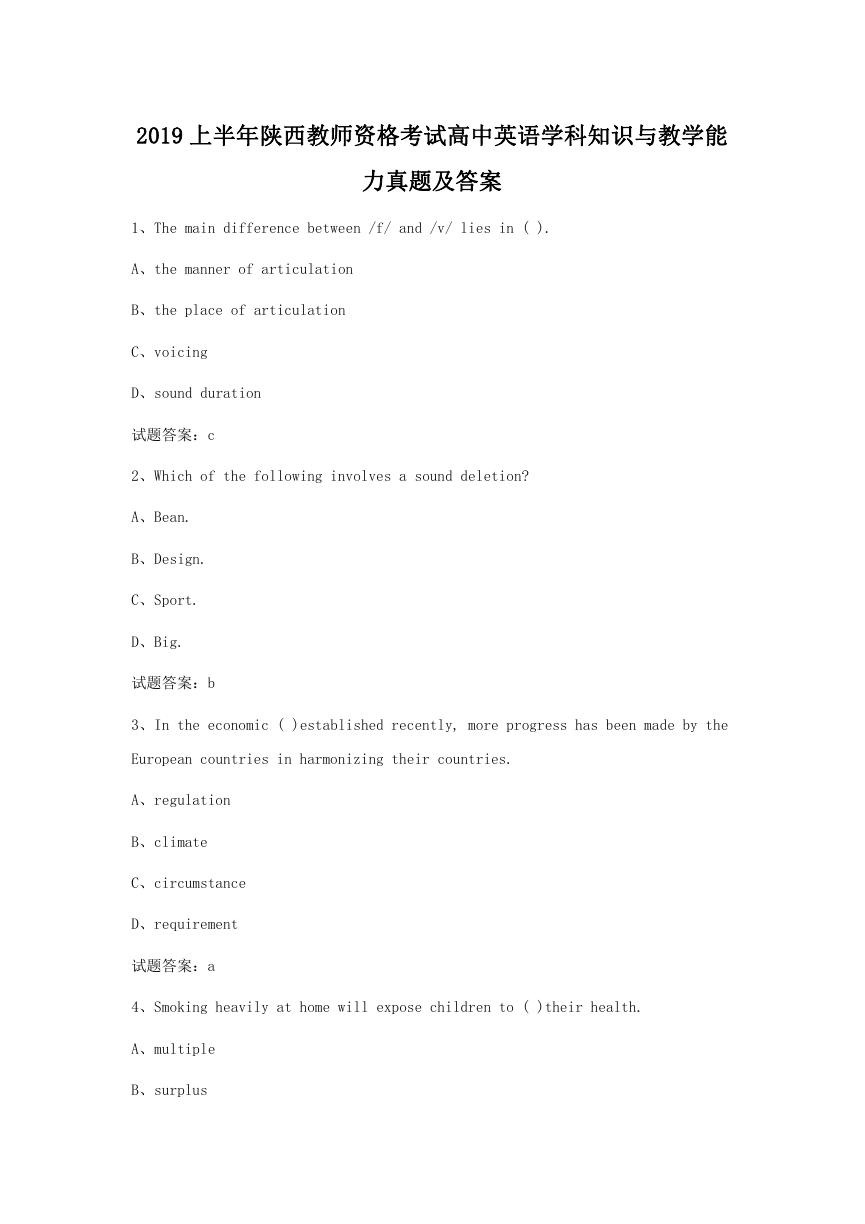
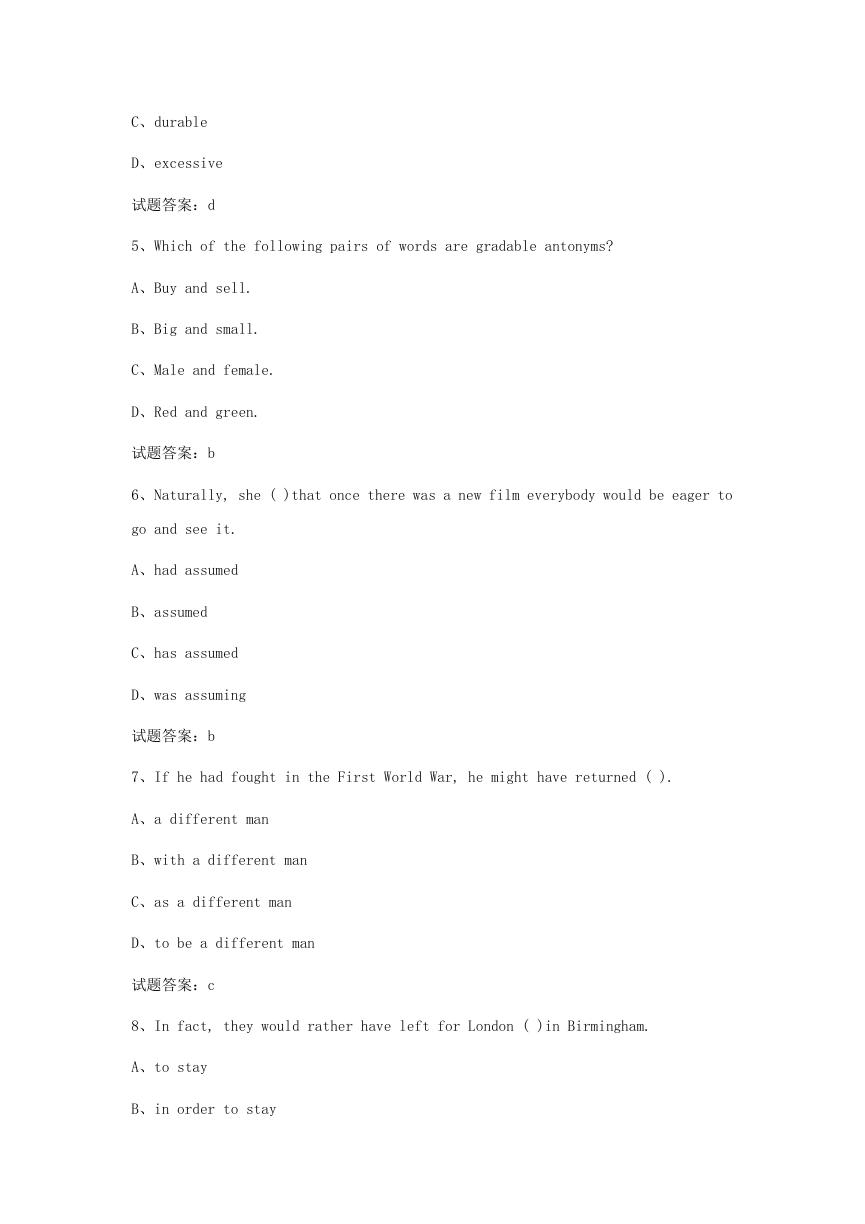
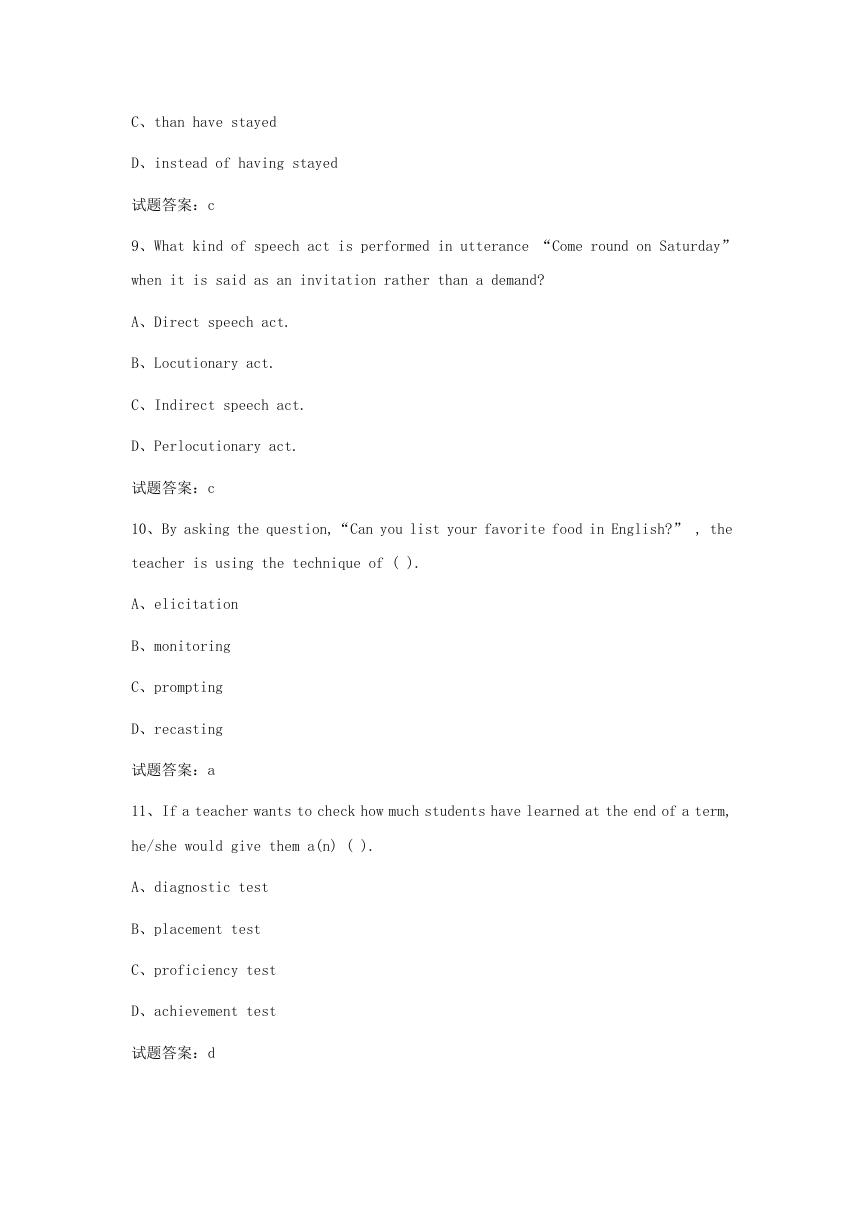
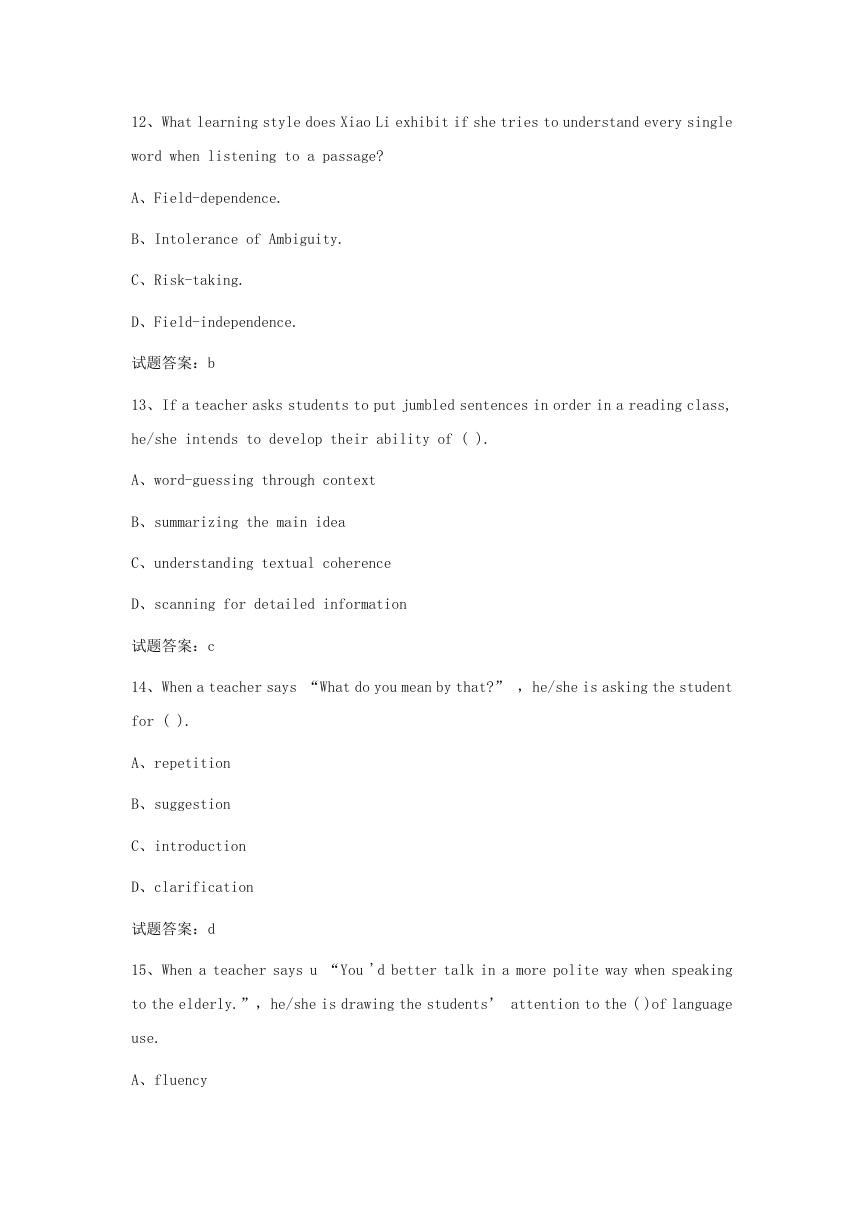
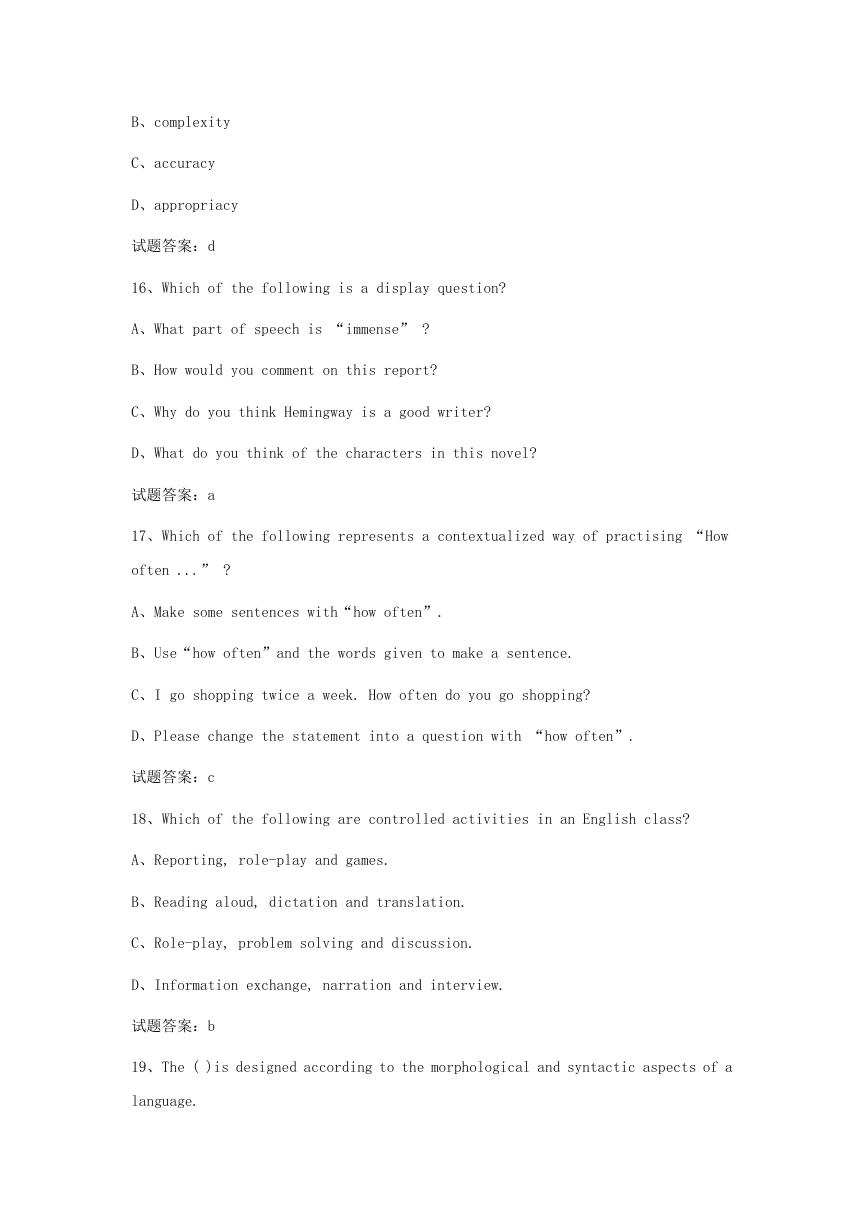
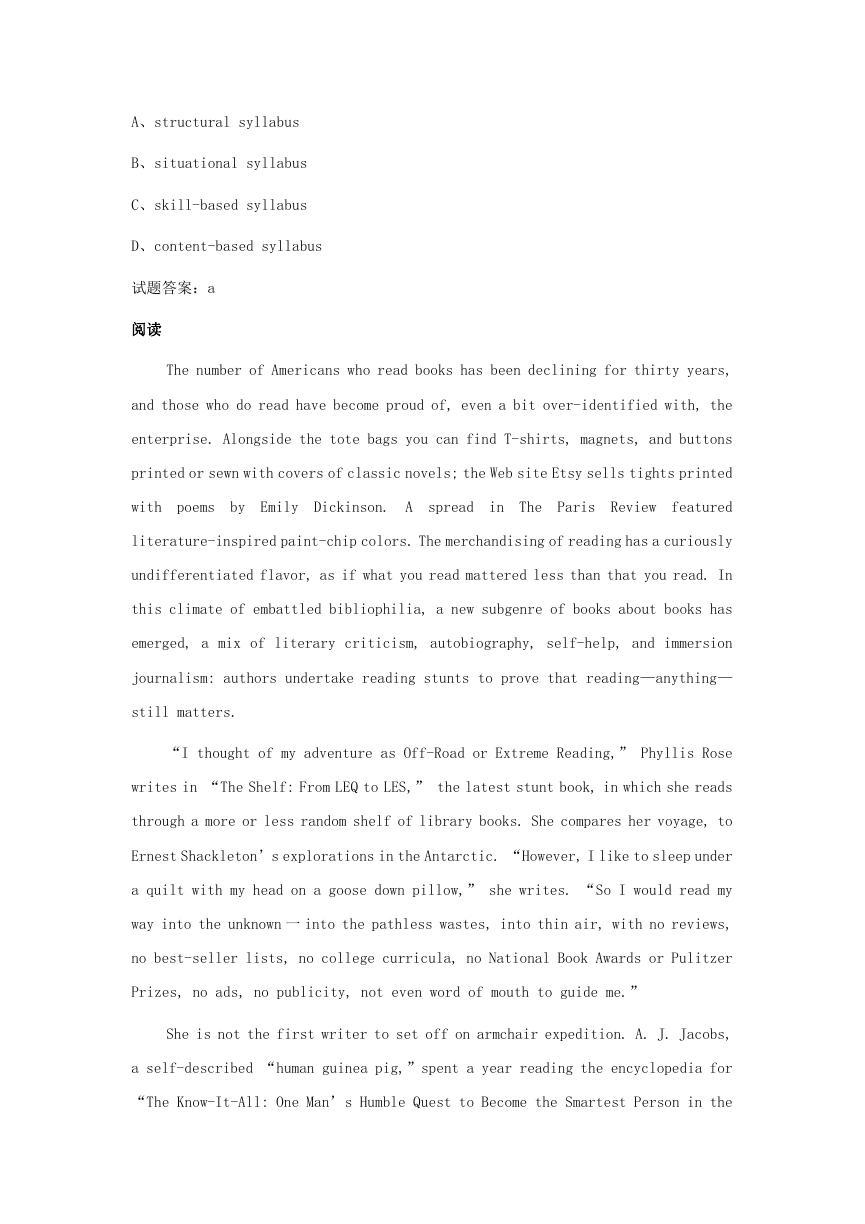

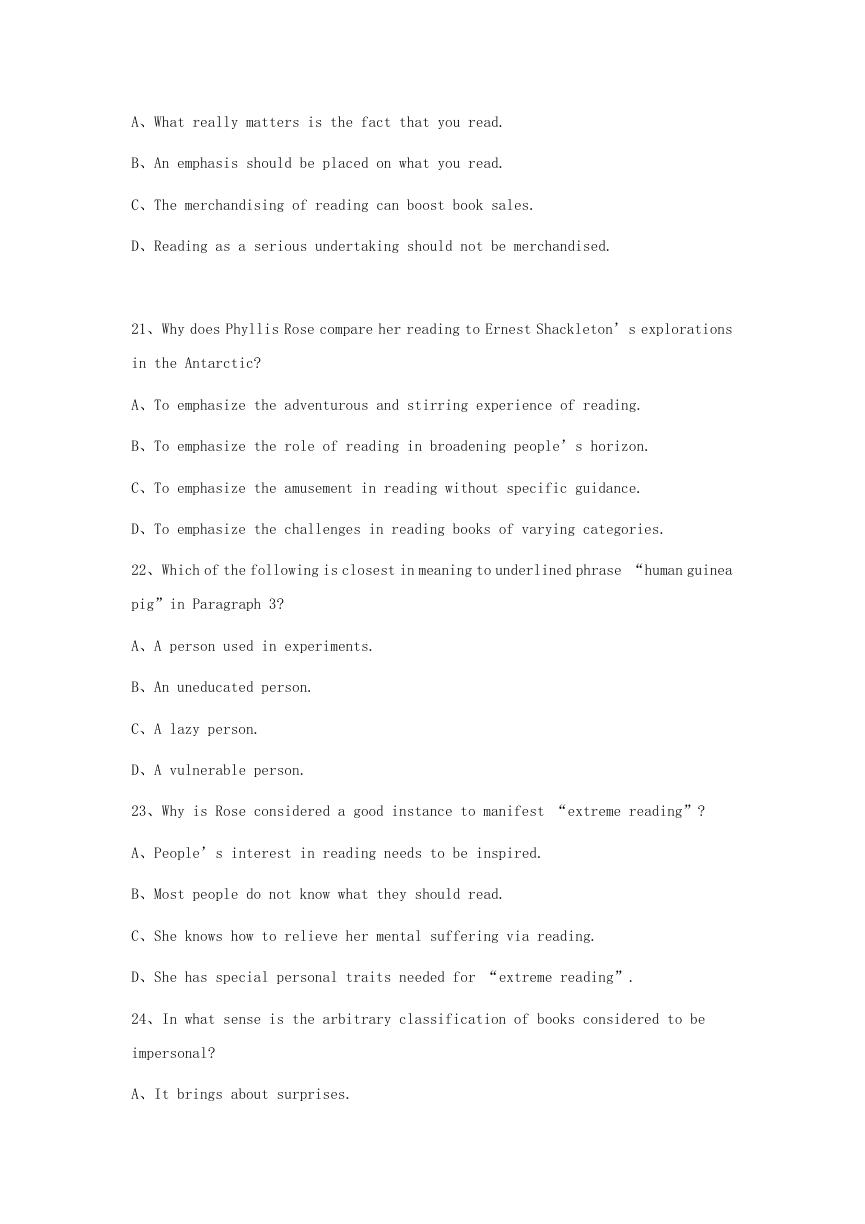








 2023年江西萍乡中考道德与法治真题及答案.doc
2023年江西萍乡中考道德与法治真题及答案.doc 2012年重庆南川中考生物真题及答案.doc
2012年重庆南川中考生物真题及答案.doc 2013年江西师范大学地理学综合及文艺理论基础考研真题.doc
2013年江西师范大学地理学综合及文艺理论基础考研真题.doc 2020年四川甘孜小升初语文真题及答案I卷.doc
2020年四川甘孜小升初语文真题及答案I卷.doc 2020年注册岩土工程师专业基础考试真题及答案.doc
2020年注册岩土工程师专业基础考试真题及答案.doc 2023-2024学年福建省厦门市九年级上学期数学月考试题及答案.doc
2023-2024学年福建省厦门市九年级上学期数学月考试题及答案.doc 2021-2022学年辽宁省沈阳市大东区九年级上学期语文期末试题及答案.doc
2021-2022学年辽宁省沈阳市大东区九年级上学期语文期末试题及答案.doc 2022-2023学年北京东城区初三第一学期物理期末试卷及答案.doc
2022-2023学年北京东城区初三第一学期物理期末试卷及答案.doc 2018上半年江西教师资格初中地理学科知识与教学能力真题及答案.doc
2018上半年江西教师资格初中地理学科知识与教学能力真题及答案.doc 2012年河北国家公务员申论考试真题及答案-省级.doc
2012年河北国家公务员申论考试真题及答案-省级.doc 2020-2021学年江苏省扬州市江都区邵樊片九年级上学期数学第一次质量检测试题及答案.doc
2020-2021学年江苏省扬州市江都区邵樊片九年级上学期数学第一次质量检测试题及答案.doc 2022下半年黑龙江教师资格证中学综合素质真题及答案.doc
2022下半年黑龙江教师资格证中学综合素质真题及答案.doc